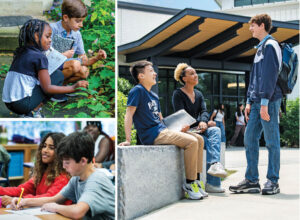This is the second of three articles this year that takes a deeper look into Abington Friends School’s envisioning of the Fourth Century of Friends Education. The Fourth Century Center addresses how schools must evolve to reflect the nature of childhood and adolescence in today’s world and how a Quaker education has the great potential to be a force for positive social change.
What does it mean to walk through spaces that honor your dignity?
I vividly remember my experience reading Susan Cain’s book, Quiet: The Power of Introverts in a World That Can’t Stop Talking. In a word, it was transformative! I learned that as an introvert, there was nothing wrong with me, I simply experienced the noise of the world differently. As I devoured each page, I discovered that my introversion, which had often been misunderstood and mislabeled as being apathetic, aloof, and anti-team, was actually an affinity for empathic listening, deep thinking, and meaningful connection. It was liberating to have what I knew to be true about myself reflected back to me in such a thoughtful, empowering and affirming way. With this new found perspective, I was poised to effectively traverse spaces often designed for extroverts; spaces in which previously I felt neither welcomed nor a genuine sense of belonging. Presently, in those spaces, I am fully aware of, honor, and lean into my inherent worth and value as an introvert, without mistaking my ways of knowing and being as the right and only way to exist. I make room for folks who are different from me, and it is my hope that I am extended that same grace and dignity in return.
I use that example from my life as a point of entry to explore the complexities and potential contradictions of Diversity, Equity, Inclusion, Justice, and Belonging (DEIJB) efforts. Sustained engagement in DEIJB work will reveal that multiple truths exist at the same time. DEIJB initiatives have proven to be both liberating and divisive, profitable and unprofitable, fruitful and fruitless. Indeed, diversity is one of our deepest strengths and one of our most important challenges. What has become abundantly clear in my role as Director of Equity, Justice, and Engagement, the success or failure of DEIJB efforts relies heavily on its framing.
What does it mean for a space to honor everyone’s dignity?
In her book, The Sum of Us: What Racism Costs Everyone and How We Can Prosper Together, author and activist Heather McGhee challenges the notion of “zero sum” framing — that any gains by another group must come at White people’s expense. A zero sum framing operates from a scarcity mindset, whereas McGhee proposes a win-win framing which operates from an abundance mindset. McGhee’s book highlights the imperative of framing and clearly articulating the value proposition of social justice work for all stakeholders; from the most marginalized to the most privileged, from the cynics to the optimists; from the dogmatists to the pragmatists. And yet, even with intentional and inclusive framing, humans are going to be humans. So how do we account for the intricacies and incongruencies of human nature? How do we honor individual freedom within a diverse community? Developing a Culture of Dignity is a great place to start.
This past summer, our professional community read Belonging Through A Culture Of Dignity by Floyd Cobb and John Krownapple. This book outlines the keys to successful equity implementation and offers a roadmap for individual and institutional growth. The authors lift up the work of Donna Hicks to illustrate one of the book’s core tenets, defining Dignity and differentiating it from Respect. In short, the authors define dignity as, “...the innate, equal worth of each human being simply because that person is human. Dignity is our common heritage and birthright as human beings.” Furthermore, they suggest that dignity is key and that we build belonging by honoring dignity. Simple and straightforward, right? If only it were that easy. As I mentioned previously, human beings will be human beings. We all have flaws and shortcomings, and at times fall short of the Light that is within us. As such, though we may strive to honor another person’s dignity, there are times when we may violate a person’s dignity. Truly, the tenet of dignity is a complex and critical concept to unpack and understand.
Culture eats strategy for breakfast.
– Attributed to Peter Drucker
The Fourth Century Center at Abington Friends School
As we envision the fourth-century of Friends education and develop The Fourth Century Center, grounded and guided by our Quaker values and bold convictions, we will continue to identify resources and implement protocols and policies that will enable us to fully envision and live the promise of an equitable, inclusive, and just community. As laid out in our 2022–2027 Strategic Plan, the Fourth Century Center will be a “multidisciplinary center of learning and innovation that will richly support the lives of teachers as educators and program designers and fuel our thinking for transformative education.”
To that end, here are some queries to help us wrestle with the push-and-pull nature of the human condition, in hopes of reaching higher ground and developing a culture of dignity intrapersonally, interpersonally, institutionally, and structurally:
- How can we strive to honor the dignity of every human being?
- How can we disagree, with dignity, with people and/or ideologies we do not respect?
- How can we identify and prioritize shared values and a shared vision that connect us?
- How can we honor our differences and leverage them for the greater good of our community?
Mikael Yisrael is the Director of Equity, Justice and Engagement at Abington Friends School. In his role, he provides strategic leadership through the lens of diversity, equity, inclusion, justice, and belonging. He is an incredible resource for faculty with respect to curriculum design, instruction, and student support, through which he develops deep, working relationships with all members of our community—students, faculty, staff, and parents.


